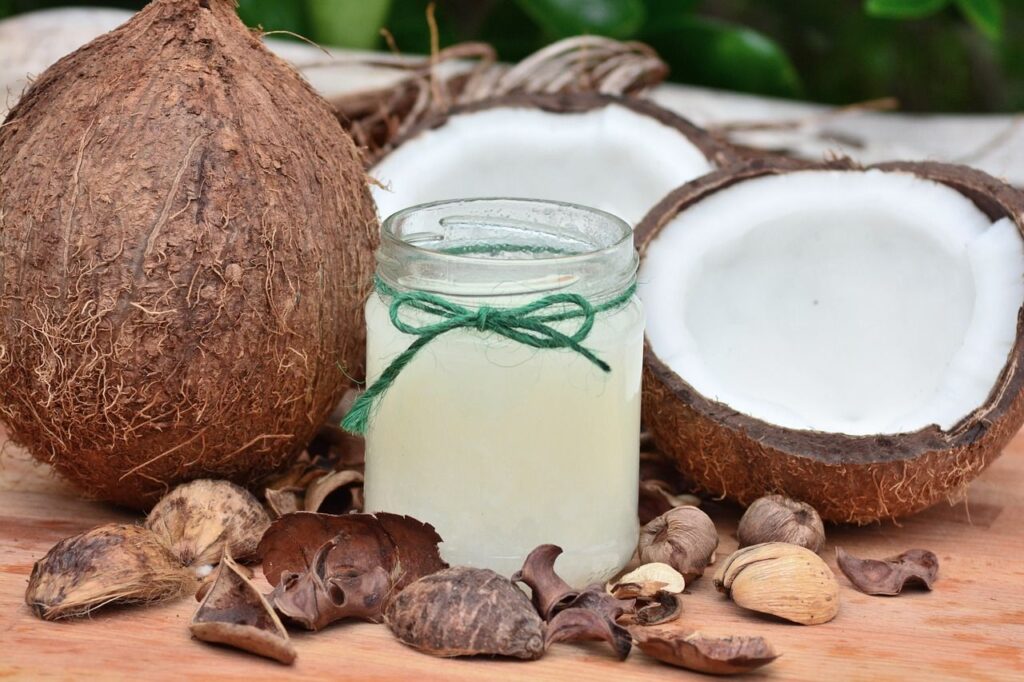Coconut oil may offer some relief for mild cases of ringworm. It contains fatty acids that have some antifungal properties. However, it’s not a guaranteed cure and shouldn’t be relied upon as the sole treatment, especially for severe or widespread infections.
Tinea Corporis (Ringworm)
Tinea corporis, commonly known as ringworm, is a common fungal skin infection that affects both children and adults. It is caused by dermatophytes (fungi of the genera Trichophyton and Microsporum).


Symptoms:
Ringworm often appears in areas like the groin, thighs, and waist, particularly in individuals who may not maintain proper hygiene. Common symptoms include:
- Intense itching.
- A ring-shaped rash, which may be red or darker than the surrounding skin, with a raised, scaly border.
- The rash may be itchy, and scratching can worsen the infection or lead to secondary bacterial infections.
- In some cases, the affected skin may become thickened and rough, resembling bark.
- Severe cases can cause widespread itching similar to psoriasis.
Treatment
Treatment should be tailored to the severity and type of infection.
Coconut oil can be applied to soothe the area. Several topical medications are available, including creams and ointments containing antifungal agents. These may include preparations containing ingredients like miconazole, clotrimazole, or terbinafine.


Siddha medicine
These remedies include:
- Coconut oil (although its effectiveness is not definitively proven for ringworm).
- Various herbal ointments and oils (e.g., Amrita vennai, Mridarsingi Ointment, Argan Coconut Oil, Chiratta Oil, Bungan Oil).
- Cassia alata (Agarwood) juice.
- Tephrosia purpurea (Tin seed) soaked in Euphorbia neriifolia (leaf juice) and applied with water.
Note: If any irritation occurs while using these remedies, discontinue use and consult a healthcare professional.
Coconut Oil (as a remedy): As mentioned earlier, coconut oil might provide some relief due to its potential antifungal properties. However, its effectiveness is limited, and it’s not a substitute for proper antifungal medication.




What Coconut Oil Might Do:
- Antifungal Properties: Coconut oil contains certain fatty acids that have shown some antifungal activity in lab studies. This means it could potentially help inhibit the growth of the fungus causing ringworm.
- Moisturizing: Ringworm can cause dry, itchy skin. Coconut oil is a good moisturizer, which can help soothe the irritation and reduce itching.
What Coconut Oil Won’t Do:
Won’t Always Kill the Fungus Completely: While coconut oil might have some antifungal action, it’s often not strong enough to completely eradicate the infection, especially in more established cases.
தேங்காயி னெய்யதனாற் றியால் வருபுண் போம்
பாங்காகக் கூந்தற் படர்ந்தேறு-நீங்காத
பல்லடியின் னோயும் படர்தா மரைசிங்கும்
அல்லறப் போமென் றறி
அ.குணவாகடம்
Clean and dry the affected area.
Apply a thin layer of coconut oil to the ringworm rash.
Repeat this 2-3 times a day.


Prevention:
The following measures can help prevent ringworm infection:
- Maintain good hygiene, including regular bathing and thorough drying of the skin, especially in skin folds.
- Avoid sharing personal items such as towels, clothing, and combs.
- Wash clothing in hot water and dry them thoroughly, preferably in sunlight.
- Use antifungal powders or creams preventatively, especially in humid environments.
Disclaimer: This information is for general knowledge and informational purposes only, It is essential to consult with a qualified healthcare professional for any health issue . Do not self-treat.


Dr. Augastina B.S.M.S., PGDY, is a passionate Siddha Doctor with a heart of gold. She believes in healing one step at a time. In her writing, you’ll find not just knowledge, but genuine care and a holistic approach to health and well-being.

